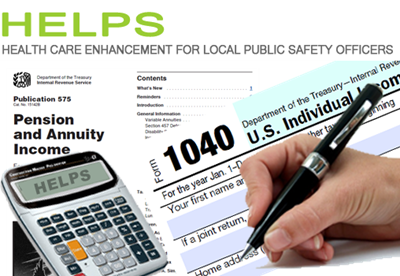
Healthcare Enhancement for Local Public Safety Officers (HELPS)
The IAFF won an unprecedented congressional victory with the passage of the Healthcare Enhancement for Local Public Safety Officers (HELPS) Act. Under the program, retirees can reduce their taxable income by up to $3,000 to help pay for health or long-term care insurance premiums.
The SECURE ACT 2.0, signed by President Joe Biden in 2022, now allows retirees to make these distributions directly to their insurance provider, no longer having to rely on retirement plan administrators to make the distribution.
Any premium paid for health, accident, or long-term care now qualifies for the credit. Married couples filing jointly can reduce their income by up to $6,000 if they are both fire fighters, emergency medical workers, or police.
.
Tax Instructions
The IAFF strongly encourages all retirees to consult their tax preparer or a licensed tax professional before claiming any HELPS benefits.
Retirees who wish to make payments themselves should claim their reduction on their personal 1040 tax forms on Line 5B. To learn more, check the IRS 2023 publication (pages 2 and 6) here.
For those who still have their retirement administrator make distributions directly, the IRS requires retirees to report total distributions on Form 1040 or Form 1040-SR, line 5a. The taxable amount should be reported on Form 1040 or 1040-SR, line 5b. Also, retirees should write “PSO” (for public safety officer) next to the appropriate line where the taxable amount is reported. Please see the highlighted section on page 27 of the Form 1040 Instructions below. For tax accountants, refer to code section 402(l).
Frequently Asked Questions
What is HELPS?
The Healthcare Enhancement for Local Public Safety (HELPS) Act, signed into law as part of the Pension Protection Act in 2006, allows retired public safety officers to reduce their taxable income from their government retirement benefit by up to $3,000. This deduction can be used to pay for expenses related to health and/or long-term care plan premiums.
Why should I take the time to get this benefit?
A large number of retired fire fighters have to pay for their health insurance. As
an active employee, they were able to pay their premiums or health care costs
with pre-tax dollars. HELPS extends this pre-tax benefit into retirement (for up to
$3,000). It could be an annual tax savings of around $750.
Who is eligible for HELPS?
If you are a retired fire fighter, law enforcement officer, chaplain, or member of a
rescue squad or ambulance crew, you are eligible for HELPS.
Is my plan eligible for this?
Eligible retirement plans include qualified defined benefit pension plans, section
403(a) plans, section403(b) annuities and section 457(b) deferred compensation
plans.
How do I get started? What exactly happens with the money?
Contact your retirement plan administrator to have these funds sent directly to your health plan(s). You can use the sample 1040 form at iaff.org/helps to report this tax benefit.
Retired employees can also make distributions directly to their providers under the new provisions. The amount which may be excluded from gross income for the tax year can’t exceed the lesser of $3,000 or the amount paid for the insurance.
The IAFF advises all members to consult with their retirement plan administrator and accountant or tax preparer to ensure the proper execution and reporting of the HELPS benefit to the IRS.
What if my retirement plan doesn’t want to participate in HELPS?
Retirement systems do not have to formally decide to participate in HELPS. They do, however, have to agree to send payments directly to your health insurance provider so you can take advantage of the HELPS tax deduction. You are eligible for the tax deduction as long as you receive a statement from your retirement plan stating how much money went directly to your health insurance provider.
Under the revised HELPS program, individual retirees may also make distributions themselves and are no longer required to have their retirement administrator do so.
Can I still receive my HELPs benefits by having my retirement plan administrator make distributions directly to my insurance provider?
Yes. The changes made to the HELPS Act remove the requirement for retirement benefit distributions to be paid directly to the insurance provider. In some instances, insurance providers may still need to receive payment directly from a retirement benefit plan. To learn more, check the IRS 2023 publication (pages 2 and 6) here.
Where can I find more information?
You can visit the National Conference on Public Employee Retirement
Systems website at www.ncpers.org, which provides further information on the
benefit.